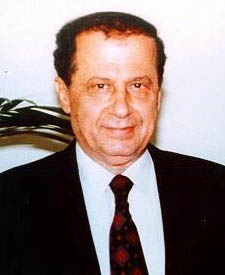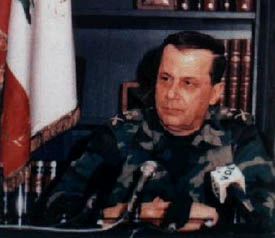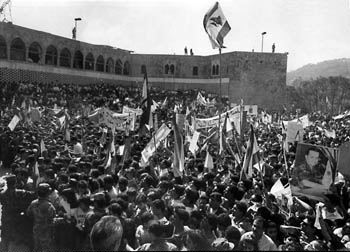 |
| Vol. 3 No. 1 | Table of Contents MEIB Main Page | January 2001 |
| | Michel Aoun Former Lebanese Prime Minister |
 |
| Michel Aoun |
For most ordinary Lebanese, however, Aoun remains the most salient symbol of secular Lebanese nationalism, a revolutionary commanding almost messianic adoration in the streets of Beirut. Many have questioned Aoun's judgement in launching his 1989 "war of liberation" against Syrian military forces, but few have questioned his integrity. Even his critics acknowledge that Aoun's refusal to compromise his principles in the face of overwhelming adversity struck a very powerful chord in the hearts of millions of Lebanese. "He was a David to an infinite Goliath," recalls former Foreign Minister Elie A. Salem, "and this image was well received by all the non-sophisticated in Lebanon, irrespective of religion and locale."1
Background
Aoun, a Maronite Christian, was born in 1935 to a poor family in Haret Hraik, a mixed Muslim-Christian suburb south of Beirut. He is remembered by many as an intelligent, hardworking child who transcended the difficult conditions of his youth. At age six, British and Australian allied forces evicted his family and occupied their house. As a child, he was forced to withdraw from school for an entire year for economic reasons and take a free apprenticeship in industrial drawing (he completed two years of coursework when he went back to school the following year so as not to fall behind).
Although his family was deeply religious and he attended Catholic schools, Aoun established close friendships with many Muslims during his early years. "We never distinguished between Ali and Peter, or between Hasan and Michel," he later recalled. "We ate together and slept at each other's homes. Their holidays were ours and our holidays were theirs."2
Aoun finished his secondary education in 1955 and enrolled in the Military Academy as a cadet officer. Three years later, he graduated as an artillery officer in the Lebanese Army. He later received additional training at Chalons-sur-Marnes, France (1958-59), Fort Seale, Oklahoma in the U.S. (1966) and the Ecole Superieure de Guerre, France (1978-80).
During the course of his military career, Aoun earned a reputation for honesty, integrity, and sectarian impartiality that was unrivaled at that time. In 1961, when two Army officers affiliated with the Syrian Social Nationalist Party (SSNP) were arrested for attempting to launch a coup, Aoun personally intervened to stop Army Intelligence from torturing the two men, a practice he felt to be inhumane and immoral. Later, after returning from an assignment and finding that the two men had been tortured while he was away, Aoun condemned the intelligence apparatus for practicing "unacceptable Nazism."
As Lebanon slipped into civil war in the mid-1970's and the army fractured along sectarian lines, Aoun devotion to the central government remained unshaken. In the early 1980's Aoun was head of the "Defense Brigade" of the Lebanese army, a unit stationed along the "Green Line" separating East and West Beirut which engaged in sporadic fighting with Syrian military forces. During the 1982 Israeli invasion of Lebanon, Aoun commanded his troops to block Israeli forces advancing on the presidential palace and was prepared to open fire until President Elias Sarkis personally ordered him to stand down. No other Christian officer attempted to confront the invading army. In late 1982, Aoun was assigned the task of forming and commanding a new multiconfessional unit, the 8th Brigade.
In 1983, Aoun's 8th Brigade defeated Syrian-backed militia forces attempting to overrun the strategic Souk al-Gharb pass overlooking the capital, a battle which one scholar called "the closest thing to real combat the Lebanese Army had ever experienced."3 In recognition of his heroic defense of the capital, Aoun was appointed Brigadier-General.
In June 1984, following the Luzanne reconciliation conference in Switzerland, Lebanon's new "national unity" government fired the commander of the Lebanese Army, Gen. Ibrahim Tannous, who was considered to have sectarian biases. Aoun was handpicked with strong consensus to replace him.
Aoun concentrated his efforts on preserving the strength and unity of the army, which remained in its barracks for the next four years amid the chaos of Lebanon's civil war, laying in wait for the day when it would be called upon to enforce a peace settlement. He intentionally stayed out of the public spotlight--aside from the armed forces' magazine, Aoun gave no interviews to the media between 1984 and 1988.
The Revolt Against Syria
In the fall of1988, Syria and the Christian Lebanese Forces (LF) militia brought about a political crisis by preventing parliament members in areas under their control to convene and elect a new president. Damascus, which staunchly opposed the election of any candidate unwilling to sign a treaty recognizing Syrian hegemony in Lebanon, wagered that the demise of the Lebanese Republic would create a political vacuum in which it could dominate the entire country. However, fifteen minutes before the expiration of his term, outgoing president Amin Gemayel appointed a military caretaker government, headed by Aoun as interim prime minister, to run the country until parliament could elect a new president. Although his government was clearly constitutional, 4 the Syrians backed the formation of a rival regime, supported by their client militias, in West Beirut. While Aoun's government was officially and implicitly recognized by several countries, most countries declined to formally recognize either regime.
At the time of Aoun's appointment, the Lebanese government controlled only a small area of the country, comprising parts of East Beirut and the surrounding suburbs. Arguing that the democratic process could not function while the vast majority of the country remained occupied by rival militias and the military forces of Syria and Israel, Aoun resolved to restore the authority of the state. In February 1989, Aoun traveled to a meeting of Arab foreign ministers in Tunisia and received strong support for the restoration of Lebanese sovereignty. After his return, Aoun responded to provocations from the LF militia by ordering the 15,000 Lebanese army troops under his command into action. After a series of engagements, Lebanese army units seized the port of Beirut and other economically vital facilities. This was the first time that government authority had been restored to a militia-controlled area since the beginning of the civil war in 1975. That Aoun chose to target the main militia of his own Maronite community evoked expressions of surprise and satisfaction from Lebanese Muslims, whose victimization at the hands of the LF had never before elicited state intervention.
Next, Aoun enforced a maritime blockade of illegal ports run by Syrian-allied Druze and Shi'ite militias in West Beirut. When the Syrians responded by shelling civilian areas of East Beirut, Aoun declared war on Syria's occupation forces on March 14, 1989. "The question is no longer one of ports," he proclaimed, " . . . we have passed this and defined the ceiling--Syrian withdrawal from Lebanon." The Syrian and Lebanese armies clashed intermittently over the next six months amid fruitless mediation efforts by the Arab League, destroying much of Beirut and instigating an exodus of over one million inhabitants from the city.
Despite the enormous destruction visited upon the inhabitants of the 300-square mile enclave controlled by his forces, popular support for Aoun's war against the Syrian military skyrocketed. The Washington Post eloquently captured the revolutionary spirit prevailing in East Beirut and across the country:
The horror of those who survived has given way to a sense of defiance and exultation that is not easy to comprehend except for those touched by Aoun's cry for freedom . . . While giving the appearance of being only a professional soldier and officer, Aoun nevertheless has reached across religious boundaries and into the hearts of many Lebanese. If the groundswell of his public support endures through more war and destruction, many observers say, Aoun could go down as a revolutionary hero in Lebanon's history.5
 |
| Aoun, at a press conference in the presidential palace |
By the end of the summer, however, it was clear that intervention by the international community was not forthcoming, so Aoun agreed to an Arab League-brokered cease-fire in September 1989. After the cease-fire, a Saudi and American-sponsored meeting of Lebanese parliamentarians was organized in Ta'if, Saudi Arabia, ostensibly to approve an agreement that would provide for the unification of Lebanon and the withdrawal of Syrian forces from the country. The final agreement did not, however, call for a Syrian withdrawal from Lebanon (Syrian officials objected to such wording, claiming that it would give Aoun a moral victory); rather, it stipulated only a limited redeployment to the Beqaa Valley within two years, after which "the Syrian government and the Lebanese national accord government shall decide on the redeployment of the Syrian forces" in the future. After heavy doses of intimidation by Syrian intelligence,7 followed by the verbal promises of American officials to rein in Damascus after Aoun's departure, the Lebanese delegates signed the so-called "Ta'if Accord."
Aoun rejected the agreement for a number of reasons, mainly because it failed to provide for a Syrian withdrawal from Lebanon. The agreement also stipulated constitutional changes which, according to Aoun, required the democratic consent of the Lebanese people--not merely the rubber stamp approval of delegates from the traditional political class which bore responsibility for the war (parliamentary elections had not been held since 1972). The Syrians and their allies in West Beirut steadfastly refused to either subject the agreement to a popular referendum or permit modification at a later date by a legitimately-elected parliament. In accordance with the Ta'if Accord, the remaining members of the Lebanese parliament met at a Syrian-controlled air force base in November 1989 and elected Rene Mouawad as President of Lebanon. After his assassination just weeks after assuming office, Elias Hrawi was elected to succeed him.
 |
| A 1989 rally in support of Aoun |
Despite his continuing popular support within Lebanon, however, outside developments doomed Aoun's "revolution" to failure. After the Iraqi invasion of Kuwait in August 1990, the American government desperately sought Syria's participation in the U.S.-led coalition against Baghdad. In return for Syrian support, the Bush administration gave Syria a green light to complete its conquest of Lebanon.8 On the morning of October 13, 1990, Syrian air and ground forces launched an all-out invasion of East Beirut and the surrounding areas controlled by Aoun's government. Realizing that further resistance would only lead to needless loss of life, Aoun went to the French embassy to negotiate a cease-fire under French auspices. As the scale of massacres and mayhem escalated and the presidential palace fell into the hands of the Syrians, Aoun accepted the French ambassador's offer of political asylum. Declaring that Aoun's safety was a "matter of honor," French President Francois Mitterand negotiated the beleaguered general's departure for exile in France ten months later.
After the Fall
Since his departure for exile in France, Aoun's predictions about what would become of Lebanon under Syrian tutelage have proven to be hauntingly accurate. Rather than withdrawing as promised, Syrian military forces have become more entrenched over the last ten years. Rather than restoring Lebanese sovereignty, Syrian officials asserted direct control over the Lebanese political system. Rather than experiencing a respite from the "disappearances" of the civil war, Lebanese have endured arbitrary arrests and detention by Syrian intelligence.
Despite his continuing exile in France, Aoun has remained the country's most prominent opposition figure. Although support for Aoun is most visible within the Christian community, where criticism of the Syrian occupation is less taboo, he has also retained considerable popularity among Lebanese Muslims in the decade following his ouster. According to a 1996 study by Judith Palmer Harik of the American University of Beirut, Aoun ranked third among Shi'ite respondents asked to name their most preferred Lebanese leader in an open-ended survey. In light of the high religiosity of the Shi'ite community, it is not surprising that two prominent and influential clerical leaders ranked above Aoun. What is surprising is that Aoun ranked above Parliament Speaker Nabih Berri, the country's leading Shi'ite politician.9
Until recently, Aoun's followers in Lebanon neglected to establish a highly-structured organization, in part to escape persecution by Syrian and Lebanese intelligence. Around 4,000 "Aounists" have been arrested and detained since 1990. In recent years, as the scale of persecution gradually declined, the movement became consolidated as the Free National Current (Al-Tayyar al-Watani al-Hurr). The FNC has become particularly active in professional and academic circles, counting over 600 teachers, 730 engineers, 300 lawyers and 250 dentists among its members. Since April of last year, the FNC has organized numerous demonstrations drawing thousands of Lebanese into the streets. In addition, FNC student activists have launched a highly successful campaign to protest the continuing presence of nearly 1 million Syrian workers in the country by performing menial labor tasks typically done by Syrians laborers.
As public opposition to Syrian hegemony has intensified since the spring of 1999, Lebanese politicians across the ideological and ethnic spectrum have begun pandering to the public by openly calling for Aoun's return. Most recently, on January 2, Prime Minister Rafiq Hariri pledged on state television to "guarantee that he will not be arrested" if he returns to the country. However, Damascus quickly stepped in to thwart the initiative. Sources in Syria say that the Assad regime is not expected to take the risk of permitting Aoun's return in the foreseeable future.
Notes
1 Elie A. Salem, Violence and Diplomacy in Lebanon (London: I.B. Tauris Publishers, 1995), p. 272.
2 Pierre Raffoul, The Betrayal of Lebanon (Lebanese Coordination Bureau of Victoria, October 2000), p. 1-2.
3 R.D. McLaurin, "Lebanon and Its Army: Past, Present, and Future," in Edward E. Azar (ed.), The Emergence of a New Lebanon: Fantasy or Reality? (New York: Praeger Publishers, 1984), p. 103.
4 In his widely acclaimed study of the Lebanese civil war, historian Theodor Hanf writes: "There can be no doubt about the constitutionality of this government. Article 53 states that the president appoints the ministers, 'one of whom he chooses as prime minister'. The premier does not have to resign; the president can dismiss him and appoint a new prime minister. Moreover, the Aoun government kept the rules of the National Pact. If the presidency is vacant, the cabinet is the sole executive . . . There was a precedent for this: in 1952, President Beshara al-Khoury appointed the commander of the army, Fouad Chehab, who was a Maronite, Prime Minister of an interim government [until elections could be held]." See Theodor Hanf, Coexistence in Wartime Lebanon: Decline of a State and Rise of a Nation (London: I.B. Tauris & Co Ltd, 1993), pp. 570-571.
5 The Washington Post, 12 April 1989.
6 The Washington Post, 12 April 1989.
7 Muslim MP Nazim Qadri was assassinated two days before the Ta'if conference convened after making public statements calling for a Syrian withdrawal. During the Ta'if negotiations, a Sunni MP from Tripoli, Abdel Majid al-Rafei, told reporters that "the presence of Syrian troops on Lebanese territory is a contravention of the Arab league charter" and that "since 1976, the Syrian regime has not only interfered [in Lebanon], but also massacred and destroyed cities." Within 24 hours, Syrian forces had arrested around 200 of his followers in and around Tripoli. [Lebanon Central News Agency, 9 October 1989]
8 An advisor to President Hrawi later paraphrased the U.S. message as follows: "If the battle is prolonged, we will have to express our regret over the continued violence in Lebanon. If you fail, we will not condemn the action but call on the Lebanese to resort to dialogue to sort out their differences . . . Israel will not interfere as long as Syria does not approach south Lebanon or threaten [Israel's] security interests." See "US Agreed Not to Block Move By Syria on Aoun, Lebanon Says," The Washington Post, 16 October 1990.
9 See Judith Palmer Harik, "Between Islam and the System: Popular Support for Lebanon's Hizballah," The Journal of Conflict Resolution ( Vol. 40, No. 1), March 1996, p.52.